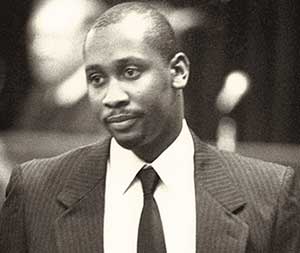‘Troy was innocent, the system is guilty’
Thousands mourn Troy Davis, victim of legal lynching
Published Oct 10, 2011 9:38 PM
By Dianne Mathiowetz
Savannah, Ga.
People started lining up outside the Jonesville Baptist Church on Sept. 21 more than two hours before the Celebration of Life service for Troy Anthony Davis was scheduled to begin. Within minutes, the line snaked around the building. By the time the opening hymn began at 11 a.m., 2,000 people had filled the pews. Most came from Savannah, Ga., but there were hundreds from Atlanta and other parts of the United States.
Davis’ family, especially his sister, Martina Correia, wanted this to be a public funeral. She played a major role in motivating organizations such as the NAACP and Amnesty International to look into her brother’s case. The almost four-hour program combined religious faith and prayer with personal testimony about Davis’ character and love of family, and exhortations against the death penalty and a racist injustice system.
A multipaged program with dozens of pictures of Davis from his childhood and family gatherings during his imprisonment was distributed. Its pages include his written statement to supporters, photos of the numerous rallies in his defense as well as copies of letters written by prominent organizations and individuals to the Georgia Pardons and Parole Board.
Among the testimonies were moving remarks by his nephew, De’Jaun Davis-Correia, and other friends, who told of Davis’ constant concern for family and of his brotherly conduct toward others on death row. Davis, whose 43rd birthday would have been Oct. 9, kept a calendar that noted special dates concerning his large family and circle of friends and supporters. One of his lawyers told the crowd that Davis stayed fully abreast of every legal proceeding and that his accounting of the details of the night of the shooting never varied in claiming his innocence.
Davis repeated his innocence as he was strapped to the gurney, waiting for the deadly poison to enter his body. His final words also conveyed compassion to those who were about to kill him.
Speakers repeatedly referred to Davis’ own words in a letter to his millions of supporters “to dismantle this unjust system.” Ben Jealous and Edward DuBose of the NAACP, Larry Cox of Amnesty International, activist Dick Gregory and others challenged the crowd to actively oppose the death penalty.
Gregory spoke about the need to recognize this historical moment and cited the murder of Emmett Till in 1955 and the explosion of civil rights activity that followed. He said that it wasn’t that many other Black men and youth hadn’t been brutally killed before and even after. Rather it was that the death of Emmett Till came to encompass all the injustices felt and experienced by millions of oppressed people who then organized a mass movem ent to change their conditions.
Among others whose words and music brought the audience to their feet were the Rev. Raphael Warnock, pastor of Atlanta’s Ebenezer Baptist Church — where a capacity crowd rallied for Davis on Sept. 16 — and acclaimed gospel singer, Deitrick Haddon.
Davis wrote a letter just weeks before his execution which said, “This is not a case about the death penalty, this is not a case about Troy Davis, this is a case about Justice and the Human Spirit to see Justice prevail.” He urged people to see that there are many Troy Davises locked up in jails and prisons in the U.S. and around the world.
“I am Troy Davis”
The slogan, “I am Troy Davis,” has been repeated in U.S. cities and towns and across the globe. It recognizes that for the vast majority of people, laws, courts, jails and prisons serve only to preserve the wealth and control of a tiny minority and do not mete out justice, compassion or fairness.
In the U.S., more than 2.3 million people are incarcerated and held in cages. Their alleged crimes pale in comparison to the theft of billions of dollars by the banks and corporations, the seizures of lands and homes by trickery and force, and the slaughter of millions of people in imperialist wars.
There were mountains of doubt created about Davis’ guilt when seven of the nine trial witnesses recanted their testimony, many claiming police threats and coercion for their false statements. Additionally, no physical evidence tied him to the death of policeman Mark MacPhail. These elements of Davis’ case elicited passionate support for him by millions of people.
The refusal of the U.S. judicial system — with all its layers of courts and judges — to act justly, and the Georgia Pardons and Parole Board’s cowardice about providing clemency are fueling a grassroots movement. The issue is not limited to the racist and unequal imposition of the death penalty but goes to the whole system of state repression embodied in the police, courts and prisons.
At the close of the service, Davis’ voice was heard, calling on people to continue the fight for justice.
As the crowd left the sanctuary, a large poster with Davis’ face and the words, “Too Much Doubt,” was distributed. As the funeral cars left to take the family and friends to his private burial, the chant, “I am Troy Davis. We are Troy Davis,” filled the air, as the mourners became demonstrators, first lining the street in honor of the cortege and then filling the intersection in resistance.
The impact of this cold-blooded, intentional murder by the state is still to be realized, but the call has gone out: Troy Davis was innocent! The system is guilty!
Articles copyright 1995-2012 Workers World.
Verbatim copying and distribution of this entire article is permitted in any medium without royalty provided this notice is preserved.
Workers World, 55 W. 17 St., NY, NY 10011
Email:
ww@workers.org
Subscribe
wwnews-subscribe@workersworld.net
Support independent news
DONATE 

